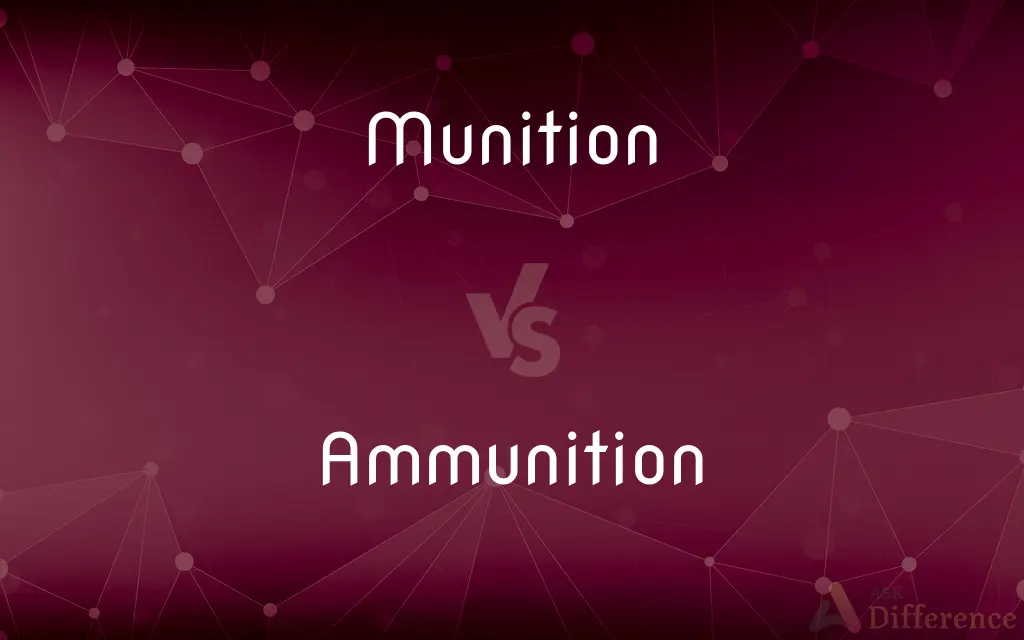Munition vs. Ammunition — What's the Difference?
Edited by Tayyaba Rehman — By Maham Liaqat — Updated on March 13, 2024
Munition refers to military weapons, ammunition, and equipment collectively, emphasizing broader military supplies, whereas ammunition specifically denotes projectiles and their propellants used in combat.

Difference Between Munition and Ammunition
Table of Contents
ADVERTISEMENT
Key Differences
Munitions encompass a wide array of military necessities, including weapons, war vehicles, and maintenance tools essential for military operations. On the other hand, ammunition is a subset of munitions, specifically focusing on items such as bullets, shells, and other projectiles, along with their propellants like gunpowder.
Munitions play a crucial role in the preparation and sustainment of military forces, highlighting the strategic aspects of military logistics and supply chain management. Whereas ammunition is directly linked to the execution of military tactics and engagements, underscoring the operational readiness of combat forces.
The procurement and management of munitions involve considerations of a broad spectrum of materials, technologies, and logistical complexities. In contrast, ammunition procurement is more focused on specific types of projectiles and propellants, aligning with the requirements of various weapons systems.
Munitions are integral to a country's defense capability, encompassing the development, production, and storage of a wide range of military equipment. Ammunition, while a critical component, is primarily concerned with ensuring the effectiveness and readiness of these systems for immediate use in conflict scenarios.
The terminology surrounding munitions often emphasizes the strategic and logistical elements of military preparedness, including aspects like manufacturing, storage, and distribution. Ammunition, conversely, is more closely associated with the tactical applications of these supplies in actual combat situations.
ADVERTISEMENT
Comparison Chart
Definition
Military weapons, equipment, and stores collectively.
Projectiles and propellants used in combat.
Scope
Broad, includes weapons, equipment, and logistical supplies.
Narrow, focuses on projectiles and their propellants.
Role
Strategic and logistical, supporting military preparedness and operations.
Operational, crucial for the execution of military tactics.
Focus
Emphasizes the entirety of military supplies and equipment.
Concentrates on the items necessary for firing weapons.
Associated Terms
Weapons, vehicles, maintenance tools.
Bullets, shells, gunpowder.
Compare with Definitions
Munition
Military weapons and warfare equipment.
The country ramped up its production of munitions in response to the growing threat.
Ammunition
Projectiles used in firearms and artillery.
Soldiers checked their firearms for sufficient ammunition before the mission.
Munition
Stores and supplies used by the military.
The army base is stocked with essential munitions for prolonged deployment.
Ammunition
Includes bullets, shells, and missiles.
The ammunition depot was secured against potential threats.
Munition
Includes both offensive and defensive military gear.
Modern munitions include advanced drones and anti-missile systems.
Ammunition
Often refers to expendable weapons.
Ammunition expenditure rates increase dramatically during active engagements.
Munition
Broad term for military logistics.
Munition management is critical for maintaining operational readiness.
Ammunition
Focused on operational readiness and tactical use.
Tactical drills include the rapid reloading of ammunition under stress.
Munition
Reflects the strategic aspect of military preparedness.
Strategic munition planning ensures a nation's long-term defense capabilities.
Ammunition
Essential for the execution of combat operations.
Ammunition shortages can critically impair a military's combat effectiveness.
Munition
War materiel, especially weapons and ammunition.
Ammunition
Ammunition (informally ammo) is the material fired, scattered, dropped or detonated from any weapon or weapon system. Ammunition is both expendable weapons (e.g., bombs, missiles, grenades, land mines) and the component parts of other weapons that create the effect on a target (e.g., bullets and warheads).
Munition
To supply with munitions.
Ammunition
Projectiles, such as bullets and shot, together with their fuses and primers, that can be fired from guns or otherwise propelled.
Munition
Materials of war: armaments, weapons and ammunition.
Ammunition
Nuclear, biological, chemical, or explosive materials, such as rockets or grenades, that are used as weapons.
Munition
Bombs, rockets, missiles (complete explosive devices, in contrast to e.g. guns).
Ammunition
Objects used as missiles in offense or defense
Rocks were my only ammunition against the bear.
Munition
A tower or fortification.
Ammunition
A means of attacking or defending an argument, thesis, or point of view.
Munition
(transitive) To supply with munitions.
Ammunition
Articles used in charging firearms and ordnance of all kinds; as powder, balls, shot, shells, percussion caps, rockets, etc.
Munition
Fortification; stronghold.
His place of defense shall be the munitions of rocks.
Ammunition
(obsolete) Military stores, or provisions of all kinds for attack or defense.
Ammunition bread
Ammunition shoes
Munition
Whatever materials are used in war for defense or for annoying an enemy; ammunition; also, stores and provisions; military stores of all kinds.
The bodies of men, munition, and money, may justly be called the sinews of war.
Ammunition
(figurative) Arguments and information that can be used against the other party in a conflict.
Munition
Weapons considered collectively
Ammunition
To supply with ammunition.
Munition
Defensive structure consisting of walls or mounds built around a stronghold to strengthen it
Ammunition
Military stores, or provisions of all kinds for attack or defense.
Munition
Supply with weapons
Ammunition
Articles used in charging firearms and ordnance of all kinds; as powder, balls, shot, shells, percussion caps, rockets, etc.
Ammunition
Any stock of missiles, literal or figurative.
Ammunition
To provide with ammunition.
Ammunition
Projectiles to be fired from a gun
Ammunition
Any nuclear or chemical or biological material that can be used as a weapon of mass destruction
Ammunition
Information that can be used to attack or defend a claim or argument or viewpoint;
His admission provided ammunition for his critics
Common Curiosities
Why is the distinction between munition and ammunition important?
The distinction highlights the difference between general military supplies and equipment (munition) and specific combat materials (ammunition), each with its strategic and operational roles.
What is munition?
Munition refers to all military weapons, equipment, and logistical supplies collectively.
How do munitions differ from ammunition?
Munitions cover a broader range of military supplies including weapons and equipment, whereas ammunition specifically focuses on projectiles and propellants.
What does ammunition mean?
Ammunition specifically refers to projectiles like bullets and shells, and their propellants, used in combat.
Can ammunition be considered a type of munition?
Yes, ammunition is a subset of munitions, specifically relating to combat projectiles and propellants.
Are munitions only offensive?
No, munitions include both offensive and defensive military equipment and supplies.
How are munitions managed?
Munitions management involves strategic planning, production, storage, and distribution of military supplies and equipment.
How critical is ammunition in warfare?
Ammunition is crucial for the execution of military tactics, determining the operational readiness and combat effectiveness of forces.
Are there different types of ammunition for different weapons?
Yes, there are specific types of ammunition designed for various firearms, artillery, and missile systems.
What role do munitions play in military operations?
Munitions encompass the broad logistical and strategic support necessary for military preparedness, including weapons, equipment, and supplies.
What is included in ammunition?
Ammunition includes bullets, shells, missiles, and other projectiles, along with their necessary propellants.
What factors affect ammunition procurement?
Factors include specific weapon system requirements, operational tactics, and readiness levels.
What challenges are associated with munition storage?
Challenges include ensuring safety, maintaining operational readiness, and managing logistical complexities.
What is the significance of munitions in national defense?
Munitions are crucial for maintaining a country's defense capabilities, encompassing a wide range of military supplies for both peacetime and conflict scenarios.
How does ammunition impact combat effectiveness?
Adequate and appropriate ammunition is essential for the success of military engagements and overall combat effectiveness.
Share Your Discovery

Previous Comparison
Submissive vs. Subservient
Next Comparison
Button vs. PinAuthor Spotlight
Written by
Maham LiaqatEdited by
Tayyaba RehmanTayyaba Rehman is a distinguished writer, currently serving as a primary contributor to askdifference.com. As a researcher in semantics and etymology, Tayyaba's passion for the complexity of languages and their distinctions has found a perfect home on the platform. Tayyaba delves into the intricacies of language, distinguishing between commonly confused words and phrases, thereby providing clarity for readers worldwide.
















































